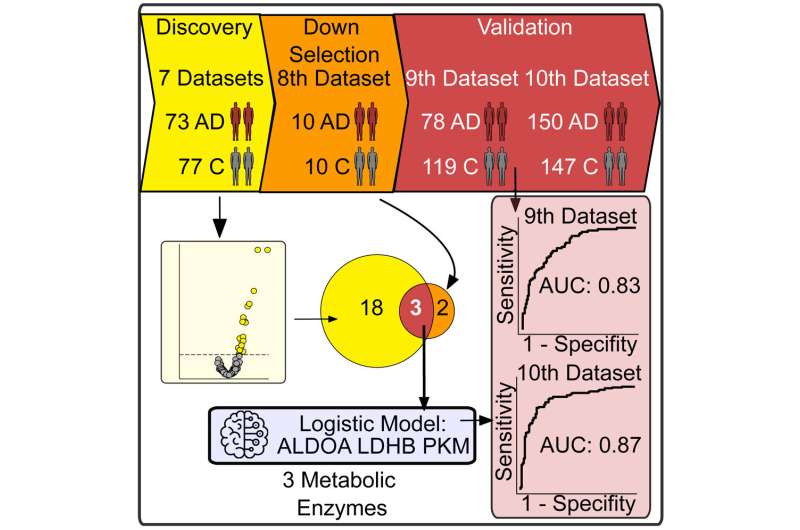Another angle on Alzheimers: CSF, proteomics, and metabolic enzymes

Currently there are no objective, easily assessed diagnostic markers for Alzheimer’s disease, and no good therapeutic options. Taking an agnostic approach, proteomics expert Hanno Steen, Ph.D., and neurobiologist Judith Steen, Ph.D., who share a lab at Boston Children’s Hospital, teamed up to analyze proteomics data from the cerebrospinal fluid (CSF) that bathes the brain, combining data from 10 different study cohorts, most of which had been published before.
Their findings, published in Cell Reports Medicine, could inform an unbiased test and perhaps new treatment approaches.
Pooling multiple data sets
To get more statistical power, the Steens and their colleagues conducted a meta-analysis of previous proteomic studies of CSF.
“Many proteomics studies only analyze very small sample sets, so the findings are inconsistent,” says Hanno Steen, who directs the Proteomics Center at Boston Children’s. “We said, ‘Let’s combine the available data together.'”
The team retrieved the raw mass spectrometry data from 170 CSF samples gathered in seven studies considered robust enough to be included in the analysis. They then developed various steps to make the data more comparable among the studies.
Their analysis yielded 21 biomarkers that appeared to differentiate people with and without Alzheimer’s. The team next sought to validate these biomarkers in proteomic data from 494 CSF samples (228 with Alzheimer’s, 266 controls) from three other studies.
This process weeded out some previously reported biomarkers and left the Steens with three significant proteins: enzymes involved in energy metabolism, in particular, associated with the breakdown of glucose: fructose-bisphosphate aldolase A, L-lactate dehydrogenase B chain, and pyruvate kinase.
In some ways, the findings weren’t a surprise. “It’s known that energy metabolism in Alzheimer’s patients is dysregulated, and imaging studies show that the use of glucose in brain is reduced,” says Judith Steen, who also directs the Neuroproteomics Laboratory in the F. M. Kirby Neurobiology Center.
“Combining all the studies strengthens the finding,” says Hanno Steen. “Since we were looking at the CSF, we had expected more neurological proteins. These metabolic proteins may not have been found before because of small datasets, or may have been dismissed as ‘boring’ metabolic proteins. But when you combine so many data sets, you can’t ignore them any longer.”
Next step: Blood samples
As a next step, the Steens want to compare how these and other proteins change in patients over time and see whether their model and findings hold up in blood samples. Understanding the role of metabolism in Alzheimer’s disease will also be essential to therapeutic approaches.
“We already have a pipeline that allows you to measure proteins of interest in plasma,” says Judith Steen. “Ideally you want to test people with a pinprick.”
More information:
Patrick W. van Zalm et al, Meta-analysis of published cerebrospinal fluid proteomics data identifies and validates metabolic enzyme panel as Alzheimer’s disease biomarkers, Cell Reports Medicine (2023). DOI: 10.1016/j.xcrm.2023.101005
Journal information:
Cell Reports Medicine
Source: Read Full Article
